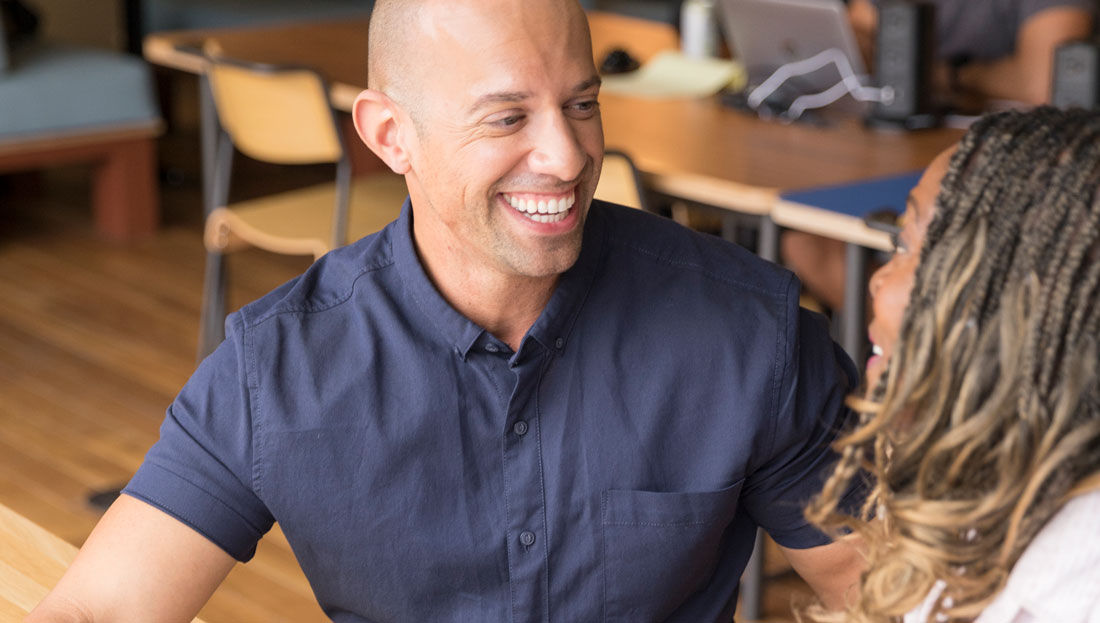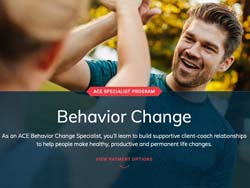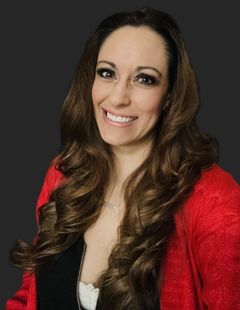
As a health and exercise professional, your clients have sought your help for a variety of reasons. However, many of the goals your clients are looking to achieve may lack structure or are focused on an outcome (weight loss, getting “toned,” eating better, etc.). To successfully accomplish these types of goals, a client needs to do more than focus on the “what” (the outcome) and, instead, emphasize the “how” (the process). Your clients need a multidimensional coach approach focused on the process of behavior change and the establishment of SMART goals that lead to the desired outcome.
“People are fully integrated beings in need of fully integrated solutions. We are body, mind and spirit,” notes Lee Jordan, an ACE Certified Health Coach and Personal Trainer, wellness consultant, educator and national presenter. “While our clients may land in our class or hire us as personal trainers propelled by a body goal, they are most assuredly seeking an outcome beyond that which can be weighed, taped or timed.” In other words, for a solution to be effective, it needs to be comprehensive.
As the fitness industry continues to grow and health coaching becomes a more recognized, respected and legitimized professional field, you may be wondering how you can incorporate elements of coaching into your existing services. This article examines the "how to” elements of marrying coaching, personal training and group fitness instruction, and answers a range of questions you may have about health coaching, including:
- How implementing coaching services into personal training and group fitness instruction can elevate your fitness clients’ experiences
- How to integrate coaching services into your existing menu of services, and whether there is an ideal business model within which you should strive to work
- How to educate your current and future clients about the services you offer
- The considerations about which you need to be aware if you are called to integrate health coaching into your practice
To address these issues, this article explores the perspectives of well-practiced and established professionals in personal training, group fitness instruction and health coaching.
Benefits of the Coach Approach
By taking a coach approach, the client becomes part of the overall process (instead of a passive recipient of advice and suggestions); the professional also assumes the role of a facilitator of behavior change. The client and the professional then work collaboratively to achieve common goals.
When you choose to coach a client toward change, the client’s overall experience is enriched. To coach a client, you need to develop an understanding of the deeper question, “Why is this client hiring me?” In exploring an answer to that question, you can strategically and effectively address the client’s needs and desires. “Often, the client may not be initially aware of what he or she is truly seeking,” explains Jordan. “However, the health and exercise pro who is prepared with behavior-change skills can activate self-discovery within the client and facilitate the client’s ability to fully formulate and envision his or her best future self.”
A similar perspective is shared by Dennis Sanchez, American Council on Exercise’s Health Coach Education and Training Lead. “When fitness pros take a coach approach, it helps clients uncover their strengths. It also takes the client out of the ‘just tell me what to do’ mentality,” thus encouraging a focus on changing the behaviors that will lead to the positive and desired outcomes.”
Trey Blaubach, an ACE Certified Personal Trainer and co-owner of Park East Fitness in Long Beach, Calif., highlights the career development benefits. “We live in a time where public awareness of the health benefits that fitness provides has never been higher,” Blaubach says. “Implementing health coaching into existing fitness services sets you apart from the competition.” Health coaching also offers the opportunity to approach clients from a wellness standpoint, explains Blaubach. “Instead of simply counting out sets and reps on an exercise, the fitness professional can impact a client’s life and wellness actualization on a more profound level.”
Integrating Coaching Services
Health coaching focuses on four key areas with clients: facilitating behavior change, increasing physical activity, developing healthy nutrition habits and modifying one's lifestyle. In contrast to traditional personal training and group fitness instruction, health coaches empower their clients and guide them toward change; they do not direct or make a plan for the client. However, personal trainers and group fitness instructors (GFIs) can successfully incorporate coaching principles into their current practices using a variety of different approaches.
Personal trainers and GFIs who have not yet pursued additional education as a health coach should consider gaining additional training in behavior-change science and interpersonal communication. Traditionally, personal training and group fitness instruction have featured a directive approach to working with clients. This style typically involves more telling and suggesting methodologies rather than coaching and facilitating behavior change and supporting lifestyle modification.
Sanchez encourages personal trainers and GFIs to develop, at a minimum, an understanding of behavioral science and motivational interviewing (MI). “Change does not happen because of the coach/trainer,” explains Sanchez. “It occurs because the change conversation brings awareness to the power of change that is within the client.”
In addition to obtaining foundational skills in MI and the science of behavior change, Angel Chelik, an adjunct professor of exercise science at Southwestern College in San Diego, Calif., and an ACE Certified Personal Trainer, GFI and Health Coach, suggests some direct methods of combining coaching with fitness services. For example, GFIs can capitalize on the collective audience they have in their classes, noting that participants in that type of setting naturally enjoy the social support and engagement aspects group fitness has to offer. “Ask members to be part of a pilot program focusing on changing habits and behaviors,” encourages Chelik. “You can meet before or after your class, once a week or every other week. Create an online group so members can ask questions and build relationships outside of the gym setting.” Obviously, discussion topics will emerge based on the unique needs and profiles of each particular group. The GFI’s role, explains Chelik, is to create a supportive scaffolding upon which members can interact, set goals and support each other in those endeavors.
For personal trainers, coaching principles can be knitted into each training session and as an adjunct to the session (either before, after or as a bonus “check-in” meeting outside of the scheduled workout time). Chelik says it’s possible to use the first 10 minutes before the workout to discuss client health behaviors. During this time, ask clients open-ended questions, track individual patterns of behavior, review those patterns and then help clients identify “next steps.” To do this mindfully, sit face to face with the client rather than discussing these topics throughout the workout when the focus should be on just that—the exercise session.
“When you take time to separate the health coaching from the training, the clients will view these as two separate services and will find more value in both,” Chelik says. Sanchez agrees and reminds professionals that “every interaction can be turned into a coaching session, with the client’s permission. It is worth noting that as a trainer you may need to ask clients if they need to bend an ear (venting), or if they need coaching (guidance uncovering solutions to an issue they are bringing up),” he says.
Of course, when it comes to offering specific services, it can be a challenge to know how—or if—you should separate your training and coaching services. Lee offers this advice: “Rather than offering a delineated menu of services, which may often lead to confusion on the part of the client, and a tendency to devalue offerings that don’t equal sweat and muscle fatigue, offer a holistic/integrated service. We know whole people need whole solutions (body, mind and spirit) to achieve, in a sustainable way, their best selves; therefore, offer one solution that involves all your skills.”
As you begin to develop and hone your coaching skills and weave them into your current practices, one thing will undoubtedly become clear: Coaching is not about directing; it’s about facilitating lifelong change.
Educating Clients
While there isn’t a one-size-fits-all method to integrating coaching principles into existing services, there are some valuable and reliable techniques you can use to educate your clients about your coaching approach.
First, market yourself as both an exercise professional and a health coach (once you have obtained the appropriate credentials). “Explain that the way you deliver your services is grounded in a coach approach and that it may feel different to clients who have had previous trainers,” urges Sanchez. Communicate to clients exactly what they can expect when working with you (facilitating vs. telling/directing).
Blaubach also suggests reinforcing the concept of non-scale victories. “Let clients know that goals don’t need to be measured in pounds and inches, but can include lifestyle goals that can be discussed and quantified,” and that you will coach them through the process. Doing so keeps the focus on meaningful process goals related to lifestyle change (e.g., coaching a client through the process of behavior change versus directing a client toward a weight or size-centered outcome).
Finally, mindfully and intentionally cultivate your mission and message around the idea of “coaching” change instead of “training” clients. While you can successfully and effectively accomplish both together, existing and future clients need to be able to connect with the holistic message.
Considerations for Practice
As evidenced by the professional insights shared in this article, coaching is a valuable tool all health and exercise professionals can apply in their everyday work. If you want to hone your coaching skills, be sure to keep these considerations at the forefront of your attention.
As with any aspect of the fitness profession, Blaubach urges professionals to work within their identified scope of practice. Be sure to refer your clients to other professionals to address specific concerns (nutritional programming, counseling, injury treatment, medical advice, etc.) that fall outside your scope.
Additionally, it is important to develop the skill of intentional listening. “Health coaching requires the development of intentional listening,” explains Sanchez. “Not just listening and waiting for one’s turn to speak, but active, intentional listening.” Equally important is the power of nonverbal communication. “Learning to listen for and interpret a client’s nonverbal communication offers additional opportunities to check-in with clients to gain a better understanding of their needs,” he says. Health and exercise professionals would benefit from practicing these skills during all client interactions.
Lastly, remember to highlight and celebrate all the wins, and to identify and emphasize the successes your clients may not see. “Remind clients that this is a journey, not a destination,” urges Sanchez, “and that we live and learn from every experience. It is reminding clients that one bad experience does not have to define the entire journey.”
Coaching is both an art and a science. It takes patience, skill and practical intention. It’s not a practice that roots and grows from single or isolated efforts and interactions with clients. Much like behavior change itself, coaching is a process that unfolds as a result of conscious and continuous nurturing. To successfully coach a client toward change, immerse yourself in the art and science of it and fully engage with that process so that you can become a partner, rather than a director, in your clients’ journey of change.
Expand Your Knowledge

ACE Health Coach Certification [certification]

ACE Behavior Change Specialist [ACE Specialist Program]

Foundations of Lifestyle Medicine [live webinar − December 18, 2019]





 by
by 





